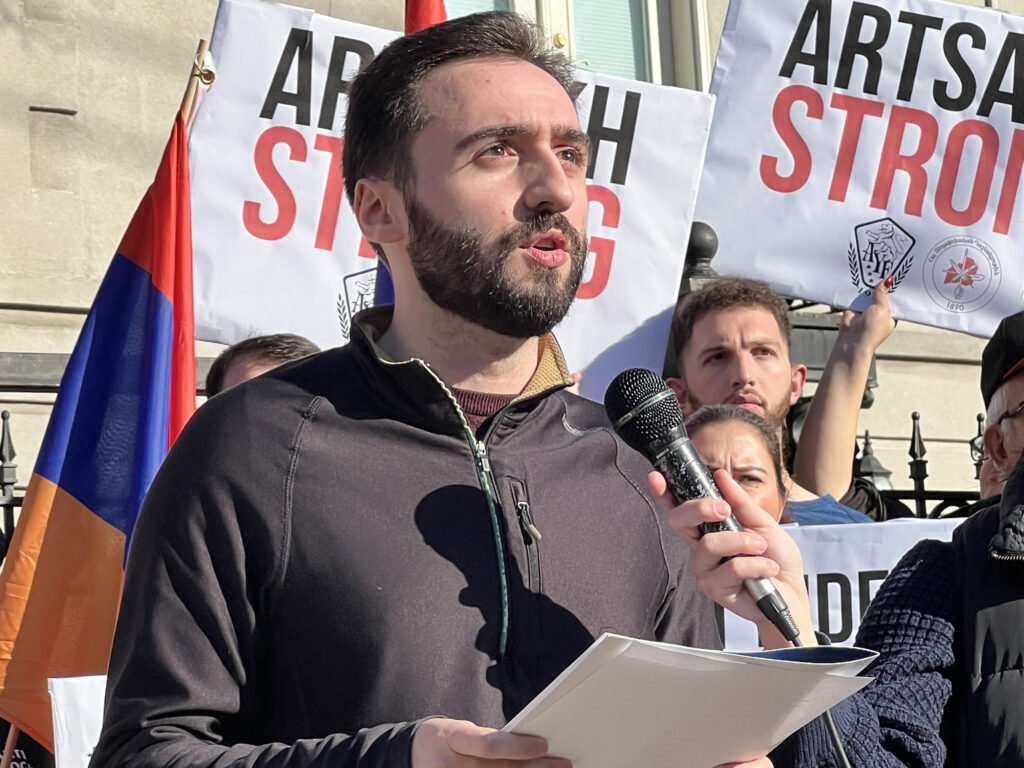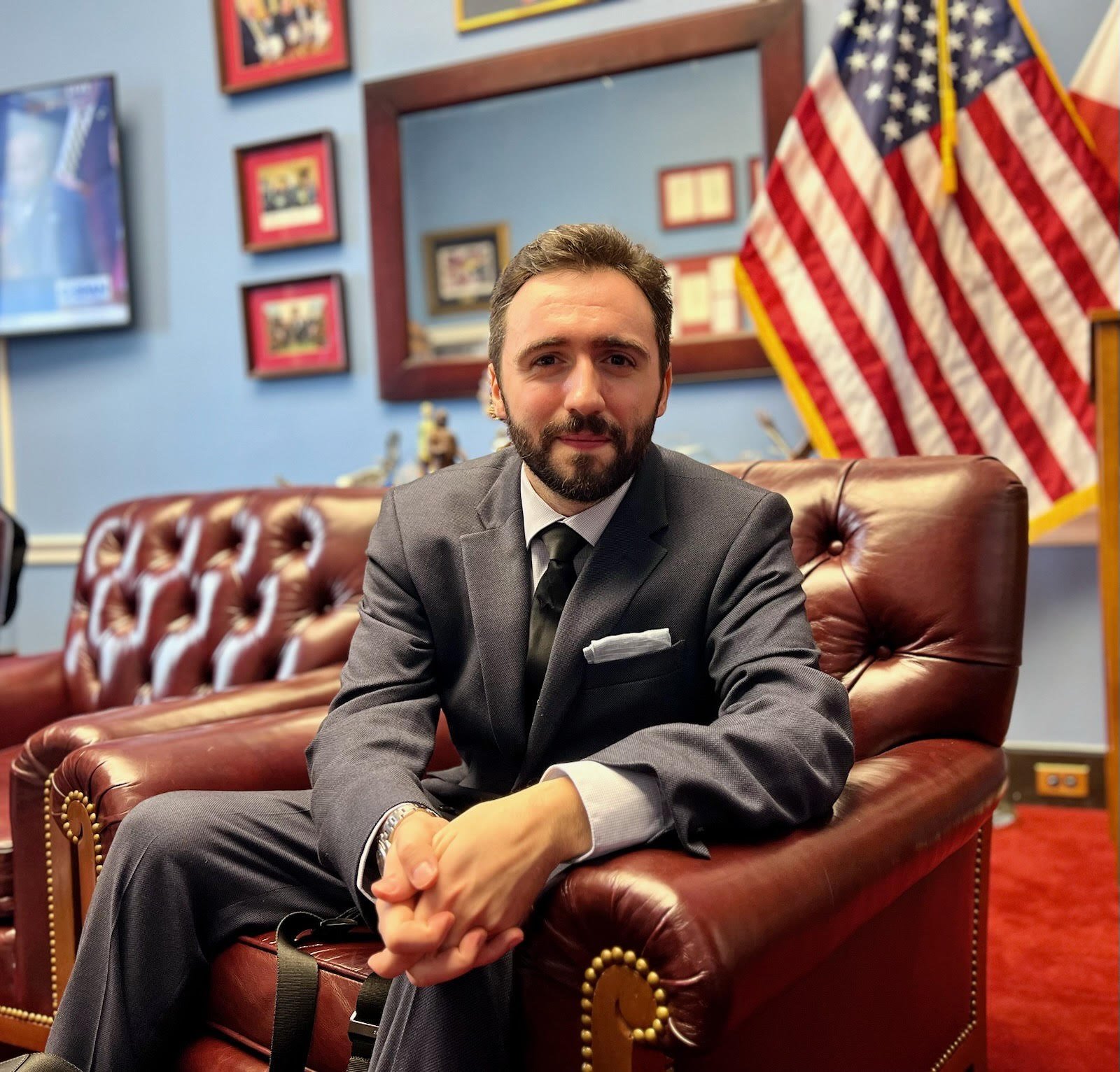
Editor’s Note: The following remarks were delivered at a February 26 protest led by the AYF DC “Ani” Chapter outside the Azerbaijani Embassy.
Today, we gather to mark the anniversary of a horrific chapter in human history and to prevent yet another catastrophe from unfolding before our eyes. We have come to honor those lost, to seek restitution for those that survived and to fight for those under brutal siege today. We come for the people of Artsakh and for their continued future. We come for our brothers and sisters who are hungry and cold yet remain resolute and mighty. We come for the people of Azerbaijan, who have been told that malice will somehow make them whole. We come to this embassy and to this day not with hate in our hearts, but with hunger in our souls for justice, peace and healing before this government and before the eyes of the world.
On February 26, 1988, officials from the Municipal Committee of Azerbaijan’s Communist Party in the city of Sumgait held a rally. With numerous speakers and officers in attendance, one disturbing chant rang through all their remarks: “death to Armenians, death to Armenians, death to Armenians.” It was such a bile that was injected into the Azeri population—a poison that has grown like a cancer ever since.
In the evening of the following day, a peace that had held generations of neighbors, families and friends from all walks of life together was shattered by evil in Sumgait. Chanting woke the town up from what had been a routine dusk. Rioters intoxicated with drugs, drink and vengeful animus roamed the streets and began an unspeakable pogrom. When the dust settled two days later, hundreds lay dead or injured. Women were raped and assaulted. Survivors would never cleanse the horror of smelling human beings burned alive. Thousands were forced to leave the only homes they had ever known. All for the simple crime of being Armenian.
But as crime went unpunished, and rioters went unprosecuted, a signal was sent by those in power: hate and degeneracy will work. As such, only months later, the venom spread to Kirovabad—100,000 men, women and children were flung from their homes to seek an uncertain future. According to human rights activists, 130 Armenians were killed and hundreds more were injured. Yet, again, the fever did not break there.
In Baku, the quarter million strong Armenian population began being dismissed from work, evicted from their homes and put under constant harassment. By the beginning of 1990, only a pale shadow of the Armenian population remained in the city. But still, that was not enough. On January 12, following still another rally of demagogues, crowds of Azeris took to the streets in a cruel emulation of Sumgait. For five days, carnage ravaged the city—people were literally torn apart limb from limb. Houses were burned with Armenians still in them. Children and pregnant women were brutalized publicly and shamelessly. All the while, authorities did nothing to stop the violence for days. And so, the fever did not break.
Since then, we have seen the consequences of an Azerbaijan trapped in this twisted dream. A culture of impunity has evolved into a culture of barbarity. In Maragha, more innocent civilians were massacred in 1992. In the second Artsakh war, we saw illegal cluster munitions deployed. We saw videos and pictures of civilians beheaded, of servicewomen’s bodies desecrated, of prisoners of war being executed. And today, we stand here while over 120,000 innocent men, women and children are being entirely blockaded by Azeri forces. For over 70 days, the indigenous people of Artsakh have stood strong, but they have for too long been fighting alone.
Thus far, we have heard pronouncements from our state department, from foreign governments, from NGOs and international forums— words without courage, full of bothsidesism and without the backing of concrete policy change.
Some may put forth the argument that this is yet another ethnic hotspot on the other side of the world that is someone else’s problem—that this should be treated as geopolitics. Some have argued that Azerbaijan is a true partner for peace and that they may wash their hands of Armenian lives for “energy security,” without consequence.
Some have argued that sacrificing Artsakh is necessary to securing the Republic of Armenia. Some have argued that warnings of genocide are hyperbole. Some have argued that Azerbaijan is a healthy society and is on the path towards peace and cooperation. Some have argued that foregoing justice and acknowledgement of the past atrocities will prevent new ones. Some believe that the fever of hate will break spontaneously, miraculously and imminently.
However, this is not a geopolitical issue. This is not a post-Soviet issue. This is not an Armenian issue. This is not a security issue. This is a humanitarian test of the highest order. This is a measure of our courage, our humanity and our determination.
My friends, we are not granted the choice of the age we are born into. We are not given the luxury of choosing our battles. We are not handed opportunity on a silver platter. All we are given are a few moments—just a few—when we have the choice to meet our challenges or to shrink from them.
To people in power in our government, I come to declare: weak vocal acknowledgements meet neither the immediacy nor gravity of today. They do not consider the long pattern of escalation we have seen by Azerbaijan and its dictator, Ilham Aliyev, over the past 35 years. They do not address in real time an attempt to ethnically cleanse a people from their ancient homeland. They do not recognize the parallels to the Armenian Genocide of 1915. After months of waiting for Aliyev and his regime to simply do right, it is clear that words unsupported by concrete action have not, cannot and will not change the situation on the ground.
To the Azeri people, I come to question: what is enough? How many pogroms will feed the hungry child in Shirvan? How many imprisoned POWs will make the widow in Baku whole? How many cultural monuments must be desecrated for a man in Sumgait to feed his family? Is this the kind of nation you are proud of? Is this the kind of regime you can stand behind? Is this who you are? I hope and I pray it is not.
To my friends, to my family, to my allies, to my community, to my fellow Armenians, I have one word and one word alone: solidarity. It is our lodestar. Solidarity is strength. Solidarity is power. Solidarity is love. It is a sacred hymn that has echoed through the mountains and the valleys. It has reached from generation to generation to tell us that our story—the structures that crumbled, the wars fought and lost, the literature unread, the music unheard, the prayers unanswered—is not over; that following the eloquence of our ancestors’ example is our duty and our mission. That ringing from the top of sacred Ararat to the cathedrals of Ani, to the shops of Stepanakert, to the shores of Akhtamar, and even to the streets of Washington, DC, the beautiful struggle has continued, the dream has lived on and the spirit has endured.
For, as the proverb goes, we cannot escape destiny. And providence has provided that our destiny is that of one people. One common future. Mek Hairenik. Mer Hairenik. The day when we fail to stand together is the day we fail to stand at all. The future of one of us is the future of all of us. So let us love our people enough to remember the taste of blood every time we bite into an apricot. Let us love our people enough to hear the ringing of the church bells of Van in our music. Let us love our people enough to feel the warmth of children’s smiles playing in liberated Shushi in the sun that shines on our faces.
So let us go forth into this future—into this new day knowing that with eyes locked on a great horizon and courage flowing through our veins, we must continue to press for a truly free, independent and united Armenia. That half-measures, half-truths and half-heartedness will secure us a fractured nation. That defeatism and denialism will lead us to ruin. We have come here today to honor the tragic milestone of the anniversary of the massacres in Sumgait, Baku, Kirovabad and Maragha. We came here to stand with our brothers and sisters in Artsakh. We came to prevent another Armenian Genocide.
But moreover, we came here today to stand for justice—and we have come too far to fail now. So let us recommit to call out hate and evil where we see it. To fight for the goodness in mankind. For that has been the Armenian way. And for that must be our way.



Be the first to comment